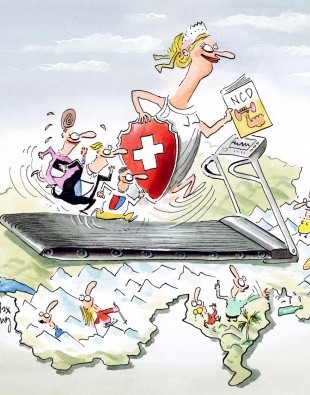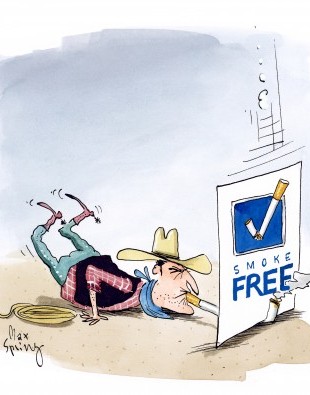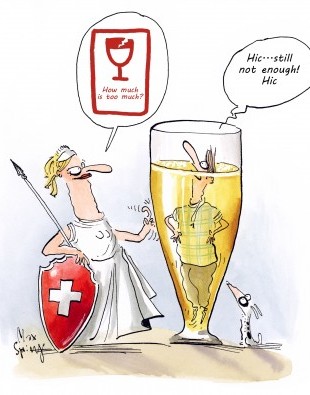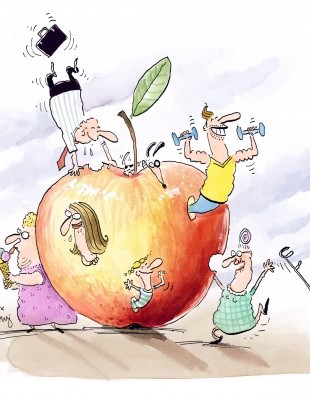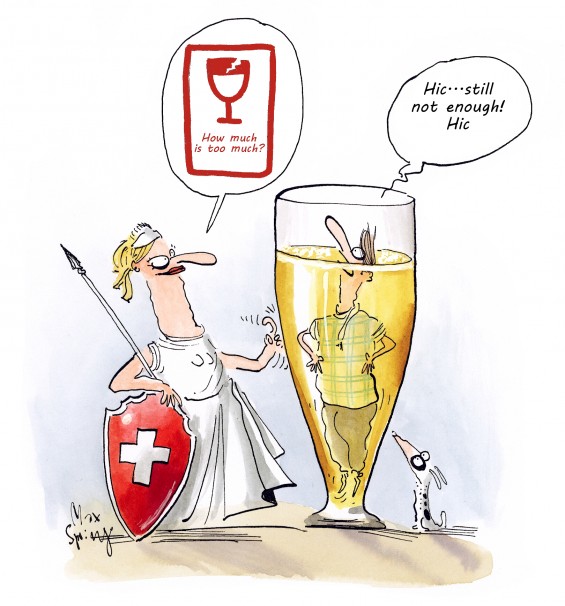
Looking back at eight years of the National Alcohol Programme
Avr. 2017End of the National Prevention Programmes
National Alcohol Programme NPA 2008–2016. Alcohol is a part of our culture – a glass of red wine with dinner, a little champagne as a toast, or a beer in the evening. However, alcohol is not a normal consumer product and one needs to learn how to deal with it. Although most people know how to drink responsibly, about one in five people drink too much, too often or at the wrong time. About 50% of all alcohol is drunk by 11 percent of the population. Excessive alcohol consumption is one of the major risk factors for chronic diseases. It has harmful consequences for society and increases the rate of traffic accidents. The annual costs for the Swiss population are about CHF 4.2 billion*. In order to address this problem, the National Alcohol Programme (NPA) was established in 2008, with the slogan: "If you drink alcoholic beverages, you do so without harming yourself or others."
In 2005, the Federal Council requested the Federal Department of Home Affairs (DHA) and thus the Federal Office of Public Health (FOPH) to review the Swiss alcohol policy. The collaborative development of a strategy paper showed that there were problems at institutional as well as societal levels:
– There was insufficient coordination between stakeholders with responsibilities relating to alcohol at national, cantonal and community levels. Communication between stakeholders was limited.
– There was not enough information, and insufficient communication of the alcohol policy. The population knew too little about the adverse consequences of alcohol abuse.
– Existing legislation, for example the age limit on selling alcohol to minors, was not enforced effectively, and the limited means of active alcohol prevention were not applied consistently.
A jointly organised approach by all stakeholders to the prevention of alcohol abuse was clearly necessary. The first National Alcohol Programme (NPA 2008–2012) was launched with its adoption by the Federal Council on 18 June 2008.
Concerted actions within one umbrella programme
The goal of the NPA was to increase people's ability to drink responsibly and decrease alcohol abuse. This required the cooperation of various stakeholders such as the federal government, the cantons, the communes and NGOs as well as schools, medical practices and the police. The NPA had seven primary objectives in ten areas. Issues such as the protection of minors, the attitude of the population and reduction of the social consequences of excessive consumption were covered by these areas.
The NPA acted as an umbrella for various measures in all parts of the programme. Supervision was the responsibility of a strategic management group consisting of the FOPH, the Swiss Alcohol Board (EAV), the Federal Committee for Alcohol Issues (EKAL), and the Swiss Conference of Cantonal Health Directors (GDK). The FOPH played a coordinating role. It was responsible for the national campaign and the associated communication, research, monitoring and evaluation, as well as for the development and dissemination of best practices.
The campaign was implemented by the FOPH and a group consisting of the Swiss Alcohol Board, the Federal Committee for Alcohol Issues, the State Secretariat for Economic Affairs (SECO), the Federal Roads Office (ASTRA), Addiction Switzerland, the Addiction Association, the Blue Cross, the Groupement Romand d'Etudes des Addictions (GREA), the Swiss Office for the Coordination of Addiction Facilities (Infodrog), the National Youth Council of Switzerland (SAJV), Ticino Addiction, the Swiss Medical Association (FMH), the Swiss Conference of Urban Security Directors (KSSD) and, until its dissolution, the Expert Group on Further Addiction Education (EWS). These important Swiss institutions took over the management of activities in collaboration with the cantonal authorities.
When the programme started, a great deal of work was done to develop the necessary co-ordination structures. Communication platforms were created and new instruments were developed. Measures for test purchases, training of sales personnel in relation to youth protection legislation, promotion of Cantonal Action Plans and the alcohol prevention campaign "I'm talking about alcohol" with the Alcohol Dialogue Week as its centrepiece were all implemented. A key element was the new funding process, which created transparency, fostered innovation and enabled the consistent allocation of resources.
The programme was first evaluated in 2010 and 2011. The report concluded that the NPA was effective as a national umbrella strategy, since it provided the various stakeholders with guidance and support. The stakeholders discussed issues with one another more frequently, while professionals, the public and politicians were all made more aware of the relevant issues. However, the absence of structural measures due to the lack of a political majority was criticised. But the conclusion was clear: the programme was well on track and should be extended.
The consolidation phase – extension of the NPA until 2016
To ensure the long-term success of the programme, the Federal Council extended the NPA in May 2012. At the same time, resources were pooled and the primary focus was placed on three issues:
– Protection of minors
– Raising public awareness of the dangers of alcohol abuse and
– Improved coordination of the various prevention programmes.
ooperation with the partners worked well during the first years, and in the second half of the programme good progress was made towards achieving its aims. Proven features of the first four years, such as meetings regarding the Cantonal Action Plan and the application process were continued. Addiction monitoring was also continued. This had been carried out annually since 2011, and provided data on the consumption of alcohol and public attitudes towards it. In addition, studies on alcohol intoxication, the relationship between violence and alcohol, and the societal costs of alcohol abuse filled gaps in the data that existed until 2008. The first national Alcohol Dialogue Week was launched in 2011 with the slogan "I'm talking about alcohol"; it was organised bottom-up as a partnership. The aim was to strengthen coordination and networking among the stakeholders, and to raise public awareness of the hazards of alcohol consumption. Since 2015, some top-down measures and the prevention slogan "How much is too much?" (alcohol-facts.ch) have been added to the biennial Alcohol Dialogue Week. The question "How much is too much?" suggests that drinkers should find a personal solution appropriate to their situation.
An external evaluation in 2015 provided an assessment of what had been achieved so far, and a basis for making decisions for the future. The results were good: most activities were implemented as planned. In addition, the meetings and further education sessions as well as concept development contributed greatly to successful information exchange and role clarification. Simple, understandable messages and arguments were used in all activities, and they were broadly and effectively advertised to the population and the target groups thanks to the good coordination between the various stakeholders. A successful era ended in December 2016 with the termination of the NPA. A great deal was accomplished in the eight years of the programme: effective measures were developed and implemented, scientific principles were outlined, and reliable information about alcohol abuse was communicated to the population in an understandable way, thanks to the partners and the campaigns. The 2017 NPA was converted into the new addiction and NCD (non-communicable disease) strategies in enhanced form, thanks in large part to the outstanding cooperation with the cantons. Work on the new strategies will continue together with the stakeholders in alcohol prevention, because alcohol abuse affects everyone, and society as a whole benefits from effective prevention.
* Fischer et al. (2014). Alkoholbedingte Kosten in der Schweiz. Schlussbericht im Auftrag des Bundesamtes für Gesundheit [Alcohol-related costs in Switzerland. Final report on behalf of the Federal Office of Public Health], at: www.newsd.admin.ch/newsd/message/attachments/34153.pdf (accessed 31.01.2017).
Contact
David Hess-Klein, Health Promotion and Prevention Section, david.hess-klein@bag.admin

